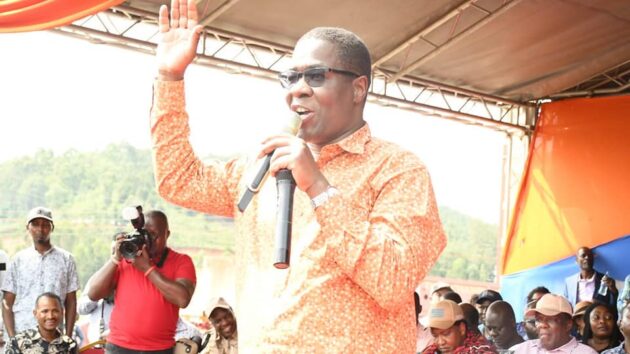
Kenya’s fuel cheaper than Tanzania’s at source, it’s taxes that keep it costly: Wandayi » Capital News
NAIROBI, Kenya, Jul 23 — Energy Cabinet Secretary Opiyo Wandayi has defended the government-to-government (G-to-G) oil import arrangement, citing comparative data that shows Tanzania is paying higher Freight and Premium (F&P) rates despite enjoying lower pump prices.
Appearing before the National Assembly Energy Committee on Tuesday, Wandayi explained that while Tanzanians paid USD 83.00 per metric tonne (MT) for Diesel, USD 135.00/MT for Super Petrol, and USD 190.00/MT for Jet A1 in tenders closed in July 2025, Kenya enjoyed lower rates under the G-to-G deal with Gulf suppliers.
“Because of the G-to-G arrangement, we were able to negotiate lower landing costs, particularly on the freight and premium rates. Without it, the situation could have been worse,” Wandayi said, noting that Kenya enjoys a 180-day credit window, significantly longer than Tanzania’s 60-day terms under the Bulk Procurement System.
Wandayi credited the G-to-G deal with maintaining uninterrupted fuel supplies since its inception in 2023 and containing what could have been a more severe spike in fuel prices amid international market shocks.
Despite the July-August 2025 price hikes, which he termed a temporary reaction to global supply issues, Wandayi dismissed concerns of a sustained fuel price spiral.
“Thanks to the G-to-G framework and our competitive freight deals, we have been able to contain the situation. Without it, the cost at the pump would be far worse,” he said.
Tax burden
While backing the G-to-G deal, Wandayi squarely blamed Kenya’s heavy taxation regime for the country’s relatively higher fuel prices compared to its neighbors.
“The taxes in our neighboring countries are lower — and that is in their wisdom and the wisdom of their parliaments. That’s why their fuel prices are lower,” he said.
Out of the current Sh186.31 retail price of petrol in Nairobi, Sh82.33 (about 45 percent) is attributed to taxes and levies.
The taxes and levies include Excise Duty at Sh21.95 per litre, Road Maintenance Levy (Sh25), VAT (Sh25.70) and Petroleum Development Levy (Sh5.40).
Other fees are Railway Development Levy, Merchant Shipping Levy, and Import Declaration Fee.
Diesel and kerosene are slightly less taxed at Sh69.67 and Sh55.14 respectively. Notably however, kerosene carries an additional Sh18 Anti-Adulteration Levy.
‘Real problem’
Wandayi noted that the tax structure — not fuel import inefficiencies — remains the “real problem.”
He said even stable global prices would not benefit Kenyans unless tax policies are restructured.
“We have not revised most fuel taxes since July 2024, but the structure itself remains heavy,” he said, pointing to the increase in the Road Maintenance Levy from Sh18 to Sh25 per litre.
Wandayi also cited the ad valorem nature of taxes — where levies rise in tandem with global price increases — as a key challenge.
According to official figures, the international prices of refined petroleum products rose between May and June 2025 by 6.72 per cent for Super Petrol, 9.33 per cent for Diesel and 8.15 per cent for Kerosene.
The spike translated to pump price impacts of Sh5.17/litre for Super Petrol, Sh4.90/litre for Diesel, and Sh5.74/litre for Kerosene.
The implementation of the second phase of hikes from the Cost of Service for the Supply of Petroleum Products (COSSOP) added another Sh2.47 to the final price.
Push back
Despite Wandayi’s explanations, lawmakers pushed back against claims that Parliament bears responsibility for the current fuel pricing structure.
Nyatike MP Tom Odege challenged Wandayi to justify the higher pump prices on account of lower pump prices across the border.
“Kenyans are listening to you carefully. What they’ll walk away with is the simple fact that fuel is cheaper across the border.”
“I represent a constituency right next to Tanzania. People are already tempted to cross over to fill up more affordably,” he added.
Turkana County MP Cecilia Asinyen strongly objected to the suggestion that Parliament had a role in price-setting.
“Since I joined Parliament, I have never once been part of any deliberation on fuel pricing,” she said.
Nambale MP Geoffrey Mulanya also demanded clarification on Wandayi’s apparent move to blame Parliament.
“What exactly did you mean by ‘in the wisdom of Parliament’? That puts us in a tough spot with our constituents.”
Embakasi South MP Julius Mawathe echoed Mulanya’ concerns.
“This Parliament has never set fuel prices (sic). Let’s be clear — this House has no hand in pricing decisions.”